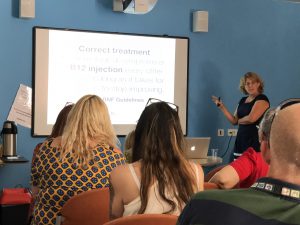On Tuesday this week I spoke in scorching North Wales about B12 deficiency to a group of nurses from different disciplines who attended an RCN Event which celebrated 70 years of the NHS.
The hope is that they will be able to take the information gained and make a difference to the patients under their care.
Those present at the event, some who were diagnosed with B12 deficiency, totally understood the situation that many patients face. Nurses are always shocked that they haven’t received any training on this very common condition.

Tracey witty & Sandra Robinson-Clark
Nurses are the ones who administer injections, hear the complaints from patients who can’t cope on the restricted three monthly regime and who are best placed to report back to the GP’s what the reality of the situation is for a patient who does not fit into the the ‘one size fits all’ treatment regime.
And it’s very clear that many nurses struggle in the same way that patients do in communicating their experience of B12 deficiency (either personally or professionally) effectively with doctors they work with.


RCN members and Kate Parry, Dr Marjorie Ghisoni, Sandra Robinson – Clark
One nurse told me that when she asked if a patient who was exhausted could have her injection earlier than 3 monthly, the reply was ‘No, it’s all in her head’. This attitude is not uncommon and even though this nurse could see the need for more frequent B12 for her patient, the door was slammed shut. This situation is ridiculous and harmful and desperately frustrating for both nurse and patient.
The reference range for North Wales is set too low at 150ng/l so consequently many deficient patients will be missed. Point 4 on this page will help you to see how harmful it can be to ignore the clinical picture and base treatment solely upon serum results.
Of course not every symptom is due to B12 deficiency but our nurses can see the benefit of being educated about this very common and commonly misdiagnosed condition. They can see that considerable cost savings can be made by screening those at risk and by giving B12 injections based on individual requirements rather than the bizarre idea that each patient’s need is the same.
I posted the following on facebook on the 3rd of July;
This week the NHS is 70 years old.
If we can help to stop the misdiagnosis of vitamin B12 deficiency, the savings for the NHS and for society as a whole would be phenomenal.
Too many patients remain mentally and physically ill and unable to work.

Tracey



Unfortunately it’s the doctors and haematologists especially who need educating! The nurses sadly do not have any power to make doctors change their uneducated minds. They are the ones who can prescribe, not the nurses.
Very true Jocelyne, however our nurses are the ones who spend more time with patients and can push the information upwards. Best wishes Tracey
I think nurses who have completed either a Nursing and Midwifery Council (NMC) Community Practitioner Nurse Prescribing course or NMC Independent Nurse Prescribing Course can prescribe medicines listed in BNF (British National Formulary). I hope this includes B12.
Well this would make a difference Sarah!
The name Tracey means ‘fighter’ and believe me she is. she has given so much of herself and her finances to help so many and she still fights on despite so many set backs.
With care and patience gave me, her mum, a new lease of life, I’m sorry I resisted for so long, but to flout doctors who really believe ‘one size fits all’ is not easy for a retired nurse like me.
I am so proud of you Tracey and maybe one day you will win, keep on fighting!
Thank you mum, your comment means so much to me. xxxx